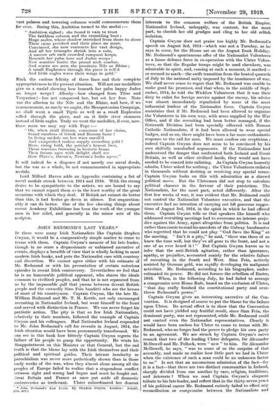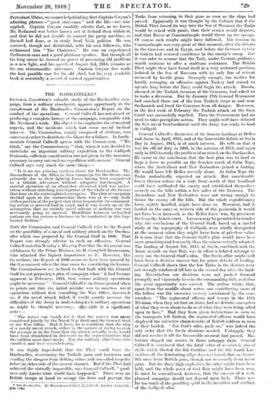JOHN REDMOND'S LAST YEARS.* Jr there were many Irish Nationalists
like Captain Stephen Gwynn, it would be a comparatively simple matter to come to terms with them. Captain Gwynn's memoir of his late leader, though in no sense a dispassionate or unbiassed narrative of events, displays a breadth of view that is wholly lacking in most modern Irish books, and puts the Nationalist case with courtesy and discretion. We cannot agree either with his estimate of Mr. Redmond or with his presentation of certain notorious episodes in recent Irish controversy. Nevertheless we feel that he is an honourable political opponent, who shares the ideals common to civilized peoples, and that he is not separated from us by the impassable gulf that yawns between decent British people and the cowardly Sinn Fein banditti who are the heroes of most of his countrymen. Captain Gwynn, like the late Mr. William Redmond and Mr. T. M. Kettle, not only encouraged recruiting in Nationalist Ireland, but went himself to the front and served with distinction in France. We can never forget his patriotic action. The pity is that so few Irish Nationalists, relatively to their numbers, followed the example of Captain Gwynn and his colleagues. Had Nationalist Ireland responded to Mr. John Redmond's call for recruits in August, 1914, the Irish situation would have been permanently transformed. We can see in this book how bitterly Captain Gwynn regrets the failure of his people to grasp the opportunity. He vents his disappointment on this Minister or that General, but the sad truth is that the blame lay with the Irish themselves and their political and spiritual guides. Their intense insularity or parochialism was never more pathetically shown than in those early weeks of the war, when they almost alone among all the peoples of Europe failed to realize that a stupendous conflict between right and wrong had begun and must be fought out. ‘.3reat Britain and France at once put aside all domestic ;:ontroversies as irrelevant. Ulster subordinated her dearest
Jolts RectmoturS Last Years. By Stephen Gwynn. London: Arnold. not.1
interests to the common welfare of the British Empire. Nationalist Ireland, unhappily, was content, for the most part, to cherish her old grudges and cling to her old selfish isolation.
Captain Gwynn does not praise too highly Mr. Redmond's speech on August 3rd, 1914—which was not a Tuesday, as he says in error, for the House sat on the August. Bank Holiday. Mr. Redmond's spontaneous offer of the Nationalist Volunteers as a home defence force in co-operation with the Ulster Volun- teers, so that the Regular troops might be used elsewhere, was admirable in spirit, and, coming at such a moment, it marked— or seemed to mark—the swift transition from the heated quarrels of July to the national unity imposed by the imminence of war. We shall never cease to regret that Mr. Redmond was unable to make good his promises, and that when, in the middle of Sept- ember, 1914, he told the Wicklow Volunteers that it was their duty to enlist for foreign service against the enemy, his advice was almost immediately repudiated by some of the most influential leaders of the Nationalist force. Captain Gwynn maintains that if Mr. Redmond had been allowed to organize the Volunteers in his own way, with arms supplied by the War Office, and if the recruiting had. been better managed, if the Sixteenth Division had been specially officered with Roman Catholic Nationalists, if it had been allowed to wear special badges, and so on, there might have been a far more enthusiastic response to the call for men. We must confess our scepticism ; indeed Captain Gwynn does not seem to be convinced by his own skilfully marshalled arguments. If the Nationalists had understood the danger that confronted both Ireland and Great Britain, as well as other civilized lands, they would not have needed to be coaxed into enlisting. As Captain Gwynn honestly admits, Ulster asked for nothing ; the Ulster Volunteers enlisted in thousands without desiring or receiving any special terms. Captain Gwynn looks on this with admiration as a shrewd political move. But the Ulstermen did not stop to calculate political chances in the fervour of their patriotism. The Nationalists, for the most part, acted differently. After the first few weeks of war, it was evident that Mr. Redmond could not control the Nationalist Volunteer executive, and that the executive had no intention of carrying out hil3 generous sugges- tions of August 3rd, 1914, in the spirit in which he had offered them. Captain Gwynn tells us that speakers like himself who addressed recruiting meetings had to overcome an intense preju- dice against the Army, apart altogether from politics. It is sad rather than comic to read his anecdote of the Galway bandmaster who regretted that he could not play "God Save the King" at the meeting. " Isn't it a pity," he said, "there was three of us knew the time well, but they've all gone to the front, and not a one of us ever heard it ! " But Captain Gwynn leaves us to infer that the anti-British agitation, rather than ignorance, apathy, or prejudice, accounted mainly for the relative failure of recruiting in the South and West. Sinn Fein, actively assisted by German gold, was rapidly developing its malignant activities. Mr. Redmond, according to his biographer, under- estimated its power. He did not foresee the rebellion of Easter, 1916. When, in the following July, he had failed to arrange a compromise over Home Rule, based on the exclusion of Ulster, " that day really finished the constitutional party and . over- threw Redmond's power."
Captain Gwynn gives an interesting narrative of the Con- vention. It is designed of course to put the blame for the failure upon Ulster. Its actual effect is to show that the Convention could not have yielded any fruitful result, since Sinn Fein, the dominant party, was not represented, while Mr. Redmond could not control even the Nationalist representatives. Clearly it would have been useless for Ulster to come to terms with Mr. Redmond, who no longer had the power to pledge his own party to an agreement. We are struck by Captain Gwynn's naive remark that two of the leading Ulster delegates, Sir Alexander McDowell and Mr. Pollock, were " new " to him. Sir Alexander McDowell, he says, " was to some of us the surprise of that assembly, and made us realize how little part we had in Ulster when the existence of such a man could be an unknown factor to us." Is not that an unconscious admission of the fact—for it is a fact—that there are two distinct communities in Ireland, sharply divided from one another by race, religion, traditions, and interests ? When we read Captain Gwynn's eloquent tribute to his late leader, and reflect that in the thirty-seven yew s of his political career Mr. Redmond entirely failed to effect any reconciliation or compromise between the Nationalists and Protestant Ulster, we cannot help thinking that Captain Gwynn's admiring phrases—" great statesman " and the like—are mis- applied. Captain Gwynn candidly admits that, as we knew, Mr. Redmond was better known out of Ireland than within it, and that he did not trouble to control the party machine, as Parnell had done, or to study local Irish polities. He was reserved, though not dictatorial, with his own followers, who nicknamed him " The Chairman." He was an experienced Parliament-man and a good platform speaker. But through all his long career he showed no power of presenting old problem in a new light, and his speech of August 3rd, 1914, remains as his one statesmanlike utterance. Captain Gwynn has made the best .possible case for his old thief, but his very readable book is essentially a record of wasted opportunities.











































 Previous page
Previous page